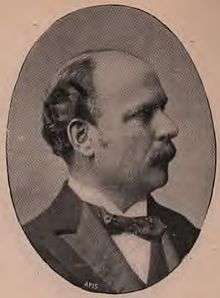Hudson Kearley, 1st Viscount Devonport
| The Right Honourable The Viscount Devonport PC DL | |
|---|---|
 | |
| Personal details | |
| Born |
Hudson Ewbanke Kearley 1 September 1856 Uxbridge, Middlesex, England |
| Died |
5 September 1934 (aged 78) Dunkeld, Perthshire, Scotland |
| Resting place | Hambleden, Buckinghamshire, England |
| Nationality | British |
| Political party | Liberals |
| Occupation | Grocer, politician |
Hudson Ewbanke Kearley, 1st Viscount Devonport, PC, DL (1 September 1856 – 5 September 1934), styled Lord Devonport between 1910 and 1917, was a British grocer and politician. He founded the International Tea Company's Stores, became the first chairman of the Port of London Authority, and served as Minister of Food Control during World War I.
Early life and business career
Devonport was the tenth and youngest child of George Ewbanke Kearley (1814–1876) and his wife, Mary Ann Hudson. He studied at Surrey County School (now Cranleigh School) and joined Tetley & Sons in 1872. In 1876, Devonport founded a tea importing company, known as Kearley and Tonge from 1887, and began retailing his own goods in 1878. In 1890, he had over 200 branches trading as International Stores and in 1895, both companies were combined to form International Tea Company's Stores and shares were offered to the public.
Marriage and family
Hudson Kearley married Selina Chester in 1888. They had three children: daughter Beryl,[1] and sons Gerald, 2nd Viscount Devonport, and Mark.
Public service

Devonport was elected as a Liberal Member of Parliament for Devonport in the 1892 general election. He was appointed a deputy lieutenant of Buckinghamshire in 1901.[2] In 1903, he was appointed Parliamentary Secretary to the Board of Trade, assisting the President of the Board of Trade, David Lloyd George. He was created a baronet, of Wittingham in the County of Buckingham, in 1908 and became a member of the Privy Council in 1909. He retired from the lower house after the January 1910 general election.
He played an important part in the passage of the Port of London Bill in 1908 and served as unpaid chairman of the Port of London Authority from 1909 until 1925.
He was elevated to the peerage as Baron Devonport, of Wittington in the County of Buckingham, in July 1910. It was reported in The New York Times that he declined to contribute to party funds in turn for the peerage, feeling that his party contribution and unpaid services in relation to the Port of London were great enough to warrant the distinction without payment. After proposing to submit the related correspondence to the press, no money was exchanged.[3]
This did not save him from being the subject of a savage epigram by Hilaire Belloc:
The grocer Hudson Kearley, he
When purchasing his barony
Considered first, we understand,
The title of Lord Sugarsand,
Or then again he might have been
Lord Underweight of Margarine:
But being of the nobler sort
He took the title Devonport.
He was appointed as Minister of Food Control in December 1916 by Lloyd George and he submitted a proposal for compulsory rationing in May 1917, seemingly delayed as to protect the interests of retailers. He resigned on 30 May, and became Viscount Devonport, of Wittington in the County of Buckingham, in July.
References
- ↑ "Sitter: Miss Beryl Kearley". Lafayette Negative Archive.
- ↑ The London Gazette: no. 27353. p. 5983. 10 September 1901.
- ↑ Cunliffe-Owen, F (17 December 1916). "Britain's Food Dictator Made Fortune as Grocer" (PDF). The New York Times. Retrieved 2009-08-09.
- Davenport-Hines, Richard (January 2008). "Kearley, Hudson Ewbanke, first Viscount Devonport (1856–1934)". Oxford Dictionary of National Biography. Oxford University Press. doi:10.1093/ref:odnb/34252. Retrieved 2009-08-09. (subscription or UK public library membership required)
- In the 1890s he built a shooting lodge called Gwylfa Hiraethog on the top of the Denbigh Moors. Although abandoned since the 1950s, it's ruins are still a prominent landmark for miles around.
External links
- Hansard 1803–2005: contributions in Parliament by the Viscount Devonport
| Parliament of the United Kingdom | ||
|---|---|---|
| Preceded by Sir John Henry Puleston George Edward Price |
Member of Parliament for Devonport 1892–January 1910 With: E. J. C. Morton 1892–1902 John Lockie 1902–1906 John Williams Benn 1906–1910 |
Succeeded by Sir John Jackson Sir Clement Kinloch-Cooke |
| Political offices | ||
| New office | Minister of Food Control 1916–1917 |
Succeeded by David Alfred Thomas |
| Peerage of the United Kingdom | ||
| New creation | Viscount Devonport 1917–1934 |
Succeeded by Gerald Kearley |
| New creation | Baron Devonport 1910–1934 | |
| Baronetage of the United Kingdom | ||
| New creation | Baronet (of Wittingham) 1908–1934 |
Succeeded by Gerald Kearley |